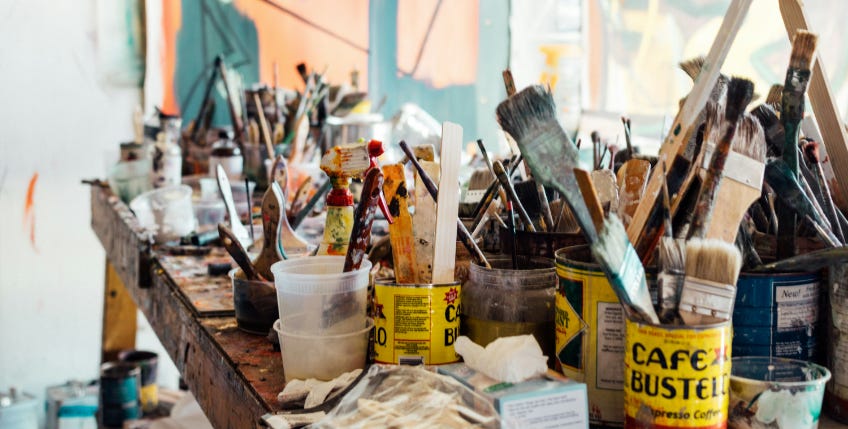Have you ever stopped to think about what art is? What it is for? What it's function in society is? As I am starting from the beginning and trying to rekindle my love of creativity, I thought I would start by thinking about what art is and where it fits in day to day life. With a lot of talk of artificial intelligence taking over our creative mantle, particularly where commercial art is concerned, I wanted to have a root from which my creativity could grow and flourish. What follows is a few of my thoughts. If you have any ideas of your own that you would like to add then please do leave a comment. I would love to read them.
During the pandemic there was a survey in Singapore's The Sunday Times about the most non-essential jobs during that time. 'Artist' came top of the vote. Yet creative people were the ones that helped cheer us and support our daily lives during the pandemic. Just look at how much art is around us now. Every day we just have to turn our heads and there is an illustration here or someone's artwork there, a story, songs and sculpture. Art is in books, on packages, in the town centre, on billboards, on home decor, on TV or the internet. It is everywhere.
So it seems to me that art is an important part of society, as well as being an expression of our humanity. Some of the earliest evidence of human history is cave art showing hunting scenes and animals. Part of our knowledge about previous cultures and time periods comes from images in art, architecture, literature, music. People with skill used pens, ink, stone, brushes and paint to show a little slice of their lives, to tell stories and to send a message to the future. It is the nearest we have to time travel.
However, these days we have 'art' being produced by technology (AI) and being used commercially. Art and design are no longer purely the domain of humans. A few well chosen words prompts a computer to spit out an image that fulfils the need of anyone looking for an illustration. But where is it's soul? AI has clinically stripped information from other pieces of art on the internet, mashed it up and produced a collection of pixels that look attractive - or not. You may have seen those AI made pictures of people with several more fingers, ears or eyes than necessary.
Yet, in my quest for a definition of art, I asked artificial intelligence (Chat GPT), 'What is art for?' It's answer:
'Art is the expression or application of human creativity, imagination, and skill, producing works appreciated primarily for their beauty, emotional power, or conceptual depth. It encompasses diverse forms, including visual arts (painting, sculpture), performing arts (music, dance, theatre), and literary arts (poetry, prose). Art reflects cultural values, communicates ideas, and evokes emotional responses, serving both personal expression and societal commentary.'
So even artificial intelligence says art is related to 'human creativity, imagination, and skill'. It is right too. Many dictionaries and sources of information on the subject, (e.g. Oxford dictionary, Britannica, Cambridge dictionary, Wikipedia to name a few) suggest art uses the imagination to express ideas or feelings. AI lacks imagination and feelings. So our nature as humans is important in creating art. That is good to know.
We can argue up hill and down dale about whether AI is worthwhile or useful or right to use. The fact is it is here. Now, as humans, do we want to keep creating art knowing that AI will be able to out perform us in speed and technical ability? Absolutely! We don't paint and draw or write to do it as quickly as possible. We do it to communicate. We don't do it perfectly. We celebrate the flaws and happy accidents. It is part of human culture. Every culture throughout history has had forms of art. It is our right to express ourselves with colour and line to produce our own vision of beauty. In 1938 Winston Churchill said:
'The arts are essential to any complete national life. The State owes it to itself to sustain and encourage them'.
I do believe he was right.
And on the point that it will take away opportunities for us to make money? Having been on the pointy end of that stick (online platforms have drowned out traditional artists with AI produced images recently), it is a big, worrying question. It may also depend on what side of the moneymaking divide you are on - fine art or illustration.
In terms of illustration, part of me says we will have to wait and see what the commercial world wants in future. Yes, I suspect AI will reduce the pay packets of illustrators and some artists. Stock images have been used by small publishers over the last few years so I am sure AI will be used by them too. No doubt larger publishers will want to save a coin or two on their production bills for new books as well.
But in order to be fresh and up to date, artists will be the people who can use their imaginations to produce cutting edge artworks. If you want the most modern style of art, you will need a human illustrator.
If someone considers art to be just 'pretty pictures' then of course AI can produce plenty of those. However, if you consider art to be the telling of a story, an indication of hard-won creative skill, a show of imagination and self-expression from an individual, the communication of ideas and emotions and an exploration of the human condition, then AI cannot compete with us.
You know, it is interesting. Over the last year I have been struggling with the issue of AI, my art not being seen on social media, the use of stock images by publishers and a host of other issues. Like many artists and illustrators, I wondered what was going to happen to art and artists and where it would all go. However, laying the arguments out on the page has allowed me to see the importance of what artists do in the world. We need to keep going, to keep telling our stories and showing our emotions. It's part of who we are.
Thank you for reading and if you feel inspired then please do leave a comment below.




